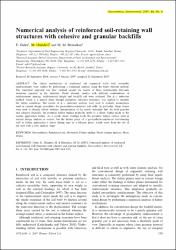Numerical analysis of reinforced soil-retaining wall structures with cohesive and granular backfills
Citation
Guler, E., Hamderi, M. & Demirkan, M. M. (2015). Numerical analysis of reinforced soil-retaining wall structures with cohesive and granular backfills. Geosynthetics International, 14 (6), 330–345.Abstract
The failure mechanisms of reinforced soil segmental walls with extensible
reinforcements were studied by performing a numerical analysis using the finite element method.
The numerical approach was first verified against the results of three instrumented full-scale
structures reported in the literature. Finite element models with different combinations of
reinforcement spacing, reinforcement length and backfill soil were analysed. The –c reduction
method, which is a special shear strength parameter reduction technique, was applied to simulate
the failure conditions. The results of –c reduction analysis were used to evaluate assumptions
used in current design procedures for geosynthetic-reinforced soil walls. In particular, shear strains
were used to identify failure surfaces. Interpretation of the results indicated that, for both granular
and cohesive backfills, the potential failure surface gradually shifts to a direct sliding mode as the
system approaches failure. As a result, under working loads the potential failure surface used in
current design analysis is correct, but the failure plane of a geosynthetic-reinforced soil-retaining
wall at failure approaches a direct sliding type or a bilinear plane, which starts from the toe of
the wall with a very shallow slope.

















